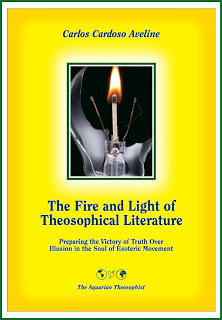
On the Sacred Art and
Mystery of Being a Just Person
Carlos Cardoso Aveline

Ancient wisdom is not seen as something new, of course – unless we have eyes to see and know that it is born again at every minute.
What exactly is the pleasure, then, of re-examining the divine wisdom present in the proverbs of Solomon?
One must examine the inner substance of the peace obtained by reading those lines. How deep is such a contentment? And – how can one make it last?
In his Proverbs (3: 13), Solomon, the son of King David, says:
“Happy is the man who finds wisdom,
The man who attains understanding.”
Wisdom corresponds to the Greek name “Sophia”, sometimes seen as a goddess. Eternal wisdom reveals the beauty of life and the spiritual soul, and Solomon proceeds:
“Her value in trade is better than silver,
Her yield, greater than gold.
She is more precious than rubies,
All of your goods cannot equal her.
In her right hand is length of days,
In her left, riches and honor.
Her ways are pleasant ways,
And all her paths, peaceful.
She is a tree of life to those who grasp her,
And whoever holds on to her is happy.”
Conquering sweet Wisdom is the true goal of life. In order to succeed, one must live in harmony with the Law of Symmetry that gives one whatever one sows. Solomon makes a warning:
“The fear of the LORD is the beginning of knowledge;
Fools despise wisdom and discipline.” (Proverbs, 1:7)
The meaning of the expression “Fear of the LORD” is simple. It means Fear of the LAW. And to have “Fear of the LAW” is tantamount to be afraid of the consequences of our own mistakes. In other words, it means to have Prudence.
Attaining divine knowledge is not an easy task. There are times when the unethical and unspiritual “fools” are many, and wise people are hard to find. This is not an unsurmountable problem. A few unknown just men can make the difference by creating healthy trends in human behavior, which will express sacred wisdom and bring about in due time a shared sense of Justice.
According to Theosophy, the Universe is born once and again, during an endless succession of eternities. Both the Cosmos and human souls reincarnate. Every Cosmos has its own symmetric periods of activity and repose, its “Days and Nights of Brahmâ”, as Hinduism says, its “manvantaras and pralayas”. Yet Divine Knowledge never dies.
Wisdom is previous to our planet.
It is older than the heavens we know. Solomon says that the cosmos is made out of Sacred Knowledge:
“The LORD founded the earth by wisdom;
He established the heavens by understanding;
By His knowledge the depths burst apart,
And the skies distilled dew.” [1]
Wisdom on earth is inseparable from ethics and righteousness. Individual selfishness provokes wishful thinking, which distorts reality. As long as one has a biased view of facts, it is impossible to know truth or attain wisdom.
Ethics is the expression of sacred knowledge in the outward world. Ethics is the Art of sowing good Karma. It includes the Science of not sowing pain to oneself or others. Therefore Solomon is right in saying:
“Do not withhold good from one who deserves it,
When you have the power to do it [for him].
Do not say to your fellow ‘Come back again;
I’ll give it to you tomorrow’, when you have it with you.
Do not devise harm against your fellow
Who lives trustfully with you.
Do not quarrel with a man for no cause,
When he has done you no harm.
Do not envy a lawless man,
Or choose any of his ways;
For the devious man is an abomination to the LORD,
But He is intimate with the straightforward.” [2]
The idea of a personal LORD ruling the Cosmos and feeling love and anger is a poetic and symbolic view of the ONE LAW.
Poetry is part of wisdom, and Solomon proceeds in his teaching about the Law of Ethics:
“The curse of the LORD is on the house of the wicked,
But He blesses the abode of the righteous.
At scoffers He scoffs,
But to the lowly He shows grace.
The wise shall obtain honor,
But dullards get disgrace as their portion.” [3]
Such is the divine rule of dynamic Equilibrium. Should we try to live up to it? At the beginning of Proverbs, 4, we have:
“Sons, heed the discipline of a father;
Listen and learn discernment,
For I give you good instruction;
Do not forsake my teaching.”
If anyone prefers to ignore the sacred art and mystery of being a just person, the fact occurs at his own expense – until one day he deserves wisdom. That day discernment will descend upon him.
There is no hurry.
The Law of Reincarnation – Gilgul in the Jewish tradition – will make sure he has as many chances as he needs.
NOTES:
[1] “The Jewish Bible, Tanakh, The Holy Scriptures”, The Jewish Publication Society, Philadelphia – Jerusalem, copyright 1985, 1624 pp., see Proverbs, 3: 19-20, p. 1289.
[2] Proverbs, 3: 27-32, according to “The Jewish Bible, Tanakh, The Holy Scriptures”, The Jewish Publication Society, pp. 1289-1290.
[3] Proverbs, 3: 33-35, according to “The Jewish Bible, Tanakh, The Holy Scriptures”, The Jewish Publication Society, p. 1290.
000
The above article was published in the associated websites on 01 September 2021. It is also available at the theosophical blog in “The Times of Israel”.
000
Read more:
000
On the role of the esoteric movement in the ethical awakening of mankind during the 21st century, see the book “The Fire and Light of Theosophical Literature”, by Carlos Cardoso Aveline.

Published in 2013 by The Aquarian Theosophist, the volume has 255 pages and can be obtained through Amazon Books.
000